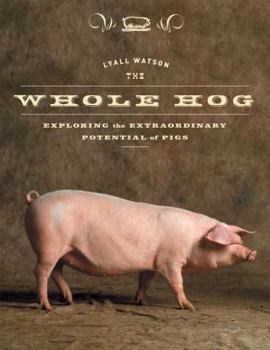The Whole Hog: Exploring the Extraordinary Potential of Pigs
Select Format
Select Condition 
Book Overview
Not all animals are created equal. For a start, pigs have it, sheep don't; that is, that special quality of intelligence, a sense of play, and a gregariousness that make these tragically... This description may be from another edition of this product.
Format:Hardcover
Language:English
ISBN:1588342166
ISBN13:9781588342164
Release Date:October 2004
Publisher:Smithsonian Books
Length:208 Pages
Weight:1.92 lbs.
Dimensions:0.8" x 7.9" x 10.1"
Customer Reviews
3 ratings
Informative, funny, fascinating, weirdly educational
Published by Thriftbooks.com User , 14 years ago
This is just a darn good book. The author clearly knows more than practically anyone else alive about pigs, and has carefully explained everything about this remarkable animal in clear, readable prose. If you want a definitive and thorough overview of pigs, read this book. It is surprisingly interesting.
Excellent!
Published by Thriftbooks.com User , 14 years ago
As always, Lyall Watson is a joy and delight with his insights. An enjoyable experience. What a fastinating animal!
---------------
Published by Thriftbooks.com User , 20 years ago
These days the majority of us are city-bred and virtually clueless when it comes to farm animals. Rarely do we get much closer to these domestic denizens than the kindergarten song about Old MacDonald's boisterous barnyard. Except, of course, when we lift our forks, at which point such creatures hardly resemble their living selves. Perhaps this mollifies our consciences, i.e. that pork and beef, lamb and fowl seem nearer those edibles springing from the earth (corn and cabbage) and less like our not-so-distant, four-legged cousins. With his 24th and latest book, Lyall Watson may inadvertently launch a new wave of vegetarianism, so charming is the porcine portrait he paints. (To counterbalance any economic shock to the meat industry, it should be mentioned that earlier in his three-decade writing career, Watson also penned a couple of essays on the topic of whether or not plants feel pain.) At any rate, once you have delved into "Whole Hog", you cannot help but come away with an altered perspective and just a bit of guilt about this `star' of so many meals. Watson describes not only the hog versions with which we are familiar, but contrasts them with their wild varieties, as well as, their close relatives, the peccaries. He intersperses scientific fact with fanciful information such as the origin of piggy banks and the distance covered by a single year's worldwide sausage production. This ode to pigs will likely bring criticism for something that has long been the bane of naturalists: anthropomorphism. Anything smacking of benevolence towards, or support of, animal consciousness elicits supercilious smirks from humans. (Are we inherently so unsure of our place in nature and our tenure as its `rulers'?) Loren Eiseley, who during his years as Benjamin Franklin Professor of Anthropology at the University of Pennsylvania, won more awards and accolades than any predecessor except Franklin, addressed this. "There is a sense in which when we cease to anthropomorphize, we cease to be men, for when we cease to have human contact with animals and deny them all relation to ourselves, we tend . . . to deny our own humanity." Watson, too, weighs in on the issue with, "It is indeed difficult to demonstrate true awareness or consciousness in other species, but it is becoming more difficult to deny the possibility of animals having minds and using mental experience in the practice of their behavior." This book is filled with sober and comical photos, statue renderings, and drawings of pigs in various situations. Several are downright endearing, reminding me of someone I knew who, in raising an occasional hog to feed his large family, maintained detachment from the animals by giving them names such as `Food' and `Dinner'. If you have read any of Lyall Watson's books, you already know the smooth, effortless quality of his writing. If you haven't, let "The Whole Hog" be your introduction to it. You may well want to go back and read others ("Dark Nature," "Sup





